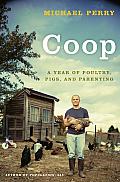
In his first book, the heavily lauded
Population: 485: Meeting Your Neighbors One Siren at a Time, Michael Perry wrote about moving back to his hometown of New Auburn, Wisconsin, after years away and getting reacquainted with his community as a member of the volunteer firefighting department. In
Truck: A Love Story, he chronicled his quest to restore a 1951 International Harvester pickup and plant a decent garden, all the while courting the woman who would become his wife.
His new memoir, Coop: A Year of Poultry, Pigs, and Parenting, picks up almost where Truck left off ? Perry has traded in his house in the village of New Auburn for 37 overgrown acres in the country with his wife and daughter, with a new baby en route.
Perry takes on fowl, firewood, and pigs (regular and guinea) while reflecting on his unorthodox childhood ? being raised in an obscure fundamentalist faith by dairy-farmer parents who took in dozens of foster children ? for clues as to how to proceed as a farmer, a husband, and a father.
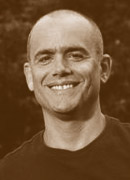
Believe it or not, the small team here at Powells.com is comprised of a higher-than-average ratio of Upper Midwesterners. (And who knows how many have yet to confess their membership to this elite club?) I spent five years living in Eau Claire, Wisconsin, and, as will happen in a smaller community, Mike Perry and I share some buddies. We'd run into each other every now and again at a reading, show, or at the favored watering hole ? which, if you've ever spent any time in Eau Claire, you'll know the one I'm referring to.
In this interview, Perry likens Coop to an Animal, Vegetable, Miracle for the rest of us ("If you want to read about what the experience really turns into when regular people do it, and do it kind of half-successfully, that's what this book is about.") and becomes the first person to ever have to interrupt a Powells.com interview in order to answer a medical first responder page. Authors: the bar has been raised.
÷ ÷ ÷
Megan: I've always been impressed by your ability to eloquently describe rural life without hiding any of the warts ? like how pigs don't bat an eyelash before devouring rabbit carcasses, and the logistics of artificially inseminating a cow. Warty and all, it's moving and relatable, maybe even more so because you don't brush the unsavory details under the rug.
Perry: [Laughter]
Megan: How do you strike a balance and extract poignancy from situations that, by conventional standards, might just seem kind of bizarre?
Perry: I wish I could say that I sit down with some sort of grand plan, but, in truth, I just watch what's going on and try to get the details. I tend to be driven by the image and start with that. The bottom line is that if you're going to write about feeding pigs, it's fun to write about the sort of goofy nature of going to buy expired bakery goods and feeding cinnamon rolls to the pigs, and it's happy and cute, but then you turn right around and find out that if you throw a dead rabbit in the pig pen, they'll eat that quite happily as well. And so I guess there's a certain power to that image, that contrast between grim reality and happier reality. The cinnamon rolls, that's reality too, but I'm always caught by the image ? that's what really gives you the veracity. Pigs will not only eat dead rabbits, they will also quite happily eat each other, and you. So why not talk about that?
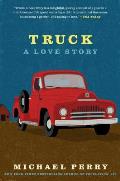 Megan: I came away from Coop with a pretty serious fear of pigs. I had no idea that they were capable of such carnage.
Megan: I came away from Coop with a pretty serious fear of pigs. I had no idea that they were capable of such carnage.
Perry: Yes, they're omnivorous, and that includes you. It's nothing personal; the pig's just hungry. And to be fair to the pig, I don't know why we're shocked about them eating us when many of us quite happily eat them.
Megan: When you're writing, do you picture your audience as your neighbors and friends, or do you see yourself as a sort of rural ambassador to those who've never experienced the culture?
Perry: Well, I always resist the idea of being some kind of ambassador or spokesperson. Because first of all, I'm just a knucklehead, and secondly, any time you start convincing yourself that you're the spokesperson for any one particular segment of society, it starts to go to your head. I'm just trying to tell a story from this perspective. Often while I'm writing, I think of that person sitting behind me reading over my shoulder. And I try to change that person around a lot. There are times, of course, that it should be your neighbor making sure you get things right, but I also often think of somebody in San Francisco or Manhattan or Mississippi reading and try to figure out what this might sound like to them, if it makes any sense. I'm asking myself, "Have I given this person enough information? Will they understand? Will someone in Poughkeepsie understand what it's like to try to hypnotize a chicken?"
Megan: I went through a snotty phase during my teens where I shunned my own dairy farm upbringing, then had an epiphany or two that restored my pride in my rural heritage. Did you experience something similar, or have you always had the sense to appreciate where you came from?
Perry: You know, this is a very unfashionable answer, but I was blessed with a wonderful childhood and I was pretty happy. I never was that kid who just couldn't wait to leave. But I certainly did leave ? when I was 16, I started working on a ranch in Wyoming, and I went off to college, and I backpacked around the country and Europe, traveled a lot. My parents, and particularly one of my grandparents, encouraged me and said that there was a whole world out there, and, if given the chance, you should go see it.
So I never really went through a phase. I always knew in the back of my mind that I wanted to end up living back home or at least out in the country somewhere. And that's what happened. I went back, spent 12 years living right in the middle of my hometown, and now we're in our second year living in the country.
Also, I think I mention this in the book, but I do believe that sense of place is pretty portable. We can be happy in a lot of places. I say that as someone who, given the choice, would spend the rest of my life in about six square miles of northern Wisconsin.
Megan: If you were forced out of Wisconsin, where would you go?
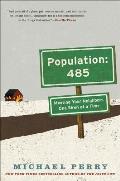 Perry: Two places come to mind immediately. One is rural Panama, just because my brother-in-law is Panamanian and my wife and children speak Spanish. We've spent a little time down there, and it would be good. But if I really wanted to indulge my inner writer, I would love to live in rural Wales. I was only there once, and it was a long time ago, and I still had hair, but it was just gray and cold and wet and stoney and I loved it. I just felt writing spirits moving everywhere.
Perry: Two places come to mind immediately. One is rural Panama, just because my brother-in-law is Panamanian and my wife and children speak Spanish. We've spent a little time down there, and it would be good. But if I really wanted to indulge my inner writer, I would love to live in rural Wales. I was only there once, and it was a long time ago, and I still had hair, but it was just gray and cold and wet and stoney and I loved it. I just felt writing spirits moving everywhere.
Megan: Publishers Weekly called you "that rare memoirist whose eccentric upbringing inspires him to humor and sympathetic insight instead of trauma mongering and self-pity." Your parents raised you in an obscure fundamentalist Christian faith, and even though you decided to leave the church, you take care not to fault them for their decision. Why do you think you ended up respecting them for this instead of being angry about it? Being mad about these sorts of things seems trendy right now.
Perry: Well, I wound up respecting them because of their day-to-day actions, year after year. I like to use the term "obscure fundamentalist Christian sect," every word of which is absolutely true, but I also am well aware that, when you use terms like "sect" and "obscure" and "fundamentalist," it sounds exciting. So, having said all that, I had an excellent childhood, and my parents are quiet, humble people. And they continue to be humble people who serve others and serve quietly. And I think one of the reasons that I cherish them is we just don't hear about those people a lot. And while I can't pretend to believe everything they believe, the world would be a better place if I spent more time acting like them.
Megan: You describe yourself as a "muddled agnostic," but at the end of Coop, you and your wife decide to start sampling a few churches for the sake of your daughters. How did you come to this decision?
Perry: One of the healthy things that children teach you is that "it ain't about you." And I am not really a bitter church guy, I'm just not a church guy. I'm willing to sort it out over the course of the journey. When you have children and they reach a certain age and they start asking particular questions, you realize that you have to give them some answers. And I believe that you owe your children your honesty. But I also believe you owe them some stability, and you also need help maintaining the critical powers of parenthood ? that is to say, remaining in charge. You also must acknowledge some of your own uncertainties to your children.
I guess what I come back to is that I think my children need a framework through which to view the world, and in which to draw their own conclusions on faith. And the only real language I know through which to discuss those matters is based on Sunday morning.
So that's where I'm at with the church thing. I'm honest, but I also know that silly agnostic me benefited from being raised by churchly people who lived as quietly and honestly as they could. And the churchly people who raised me spent a lot less time talking about hell and damnation and a lot more time talking about charity. And I mean charity in the day-to-day sense, above and beyond putting five bucks in the soup can.
Megan: Your parents have taken in more than 100 foster children, many of them disabled and some terminally ill, which you detail in Coop. Could you talk a bit about how this has influenced your own parenting philosophies?
Perry: Well, basically, that's the one area where what they have done is provided me with layers and layers of guilt. [Laughter]
Because, I must stress again, I had a wonderful childhood, but the one drawback to having parents like mine is that I look at what they've done for so many children over the years, and not only don't want recognition but have resisted it. They're not even entirely comfortable with me writing this book. How do I ever live up to all the good they've done? I feel, on a regular basis, just overwhelmed with two children, and there's my mom and dad, into their mid to late 60s now, and they're still caring for disabled children in their home, often at the expense of their own free time and priorities. So I don't really know what to say except that I'm deeply grateful to have grown up to witness two people who were that giving, and will spend much of my life trying to figure out how I can ever live up to that, most certainly falling short.
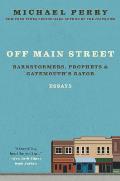 One thing I would say is that we all have certain abilities. For instance, I've been volunteering as a firefighter, EMT, and medical first responder for over 20 years now. And occasionally people will say, "Oh, that's very noble of you," and the truth is that it's just something that I, (a) enjoy, and (b) have a certain knack for. And there's a need for it, so I enjoy doing it. Not all of us are equipped to take in over 100 foster children. It turns out my mom is. And to circle back to the guilt thing, she has also served as a medical first responder for the last 20 years. I'm still not off the hook.
One thing I would say is that we all have certain abilities. For instance, I've been volunteering as a firefighter, EMT, and medical first responder for over 20 years now. And occasionally people will say, "Oh, that's very noble of you," and the truth is that it's just something that I, (a) enjoy, and (b) have a certain knack for. And there's a need for it, so I enjoy doing it. Not all of us are equipped to take in over 100 foster children. It turns out my mom is. And to circle back to the guilt thing, she has also served as a medical first responder for the last 20 years. I'm still not off the hook.
Megan: You observe in Coop that you might have bitten off more than you could chew with your farming projects, and you were having trouble being a full-time writer and holding up your end of the bargain. How's it going now?
Perry: That's funny you should ask. [Laughter]
Next week, my wife and I are going to sit down and look at the year ahead. The [book] tour is still a couple of weeks off as we speak. I'm still doing freelance writing, so I've got two magazine pieces that are due in the next week. And over the course of the next three months, I'll be away from home far more often than I am home. There's a stretch where I'll be out 25 days in a row. The reality is that I wrote a book about moving to the country and farming, but I may have to scale things back this year while I go around talking about it. As my wife quite astutely observes, she really gets a kick out of me running around telling everyone that I'm raising pigs while she's at home feeding the pigs.
But yes, I have bitten off more than I can chew, but it's a happy difficulty and should not be confused with real trouble.
Megan: Have you added anything to the menagerie?
Perry: We have. Right now, we just have chickens, because we're coming out of the winter and we add the other animals in the spring. Actually, the day after my book tour finishes in June, we're going to pick up the pigs. But last summer, which would have been the summer following the one that's described in the book, we doubled our operation. We went from two pigs to four and we ended up with 70 chickens.
Megan: Whoa!
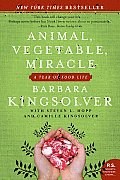 Perry: And three sheep, one goat, and of course the guinea pig. And that's another thing that I really try to stress to people, and I hope it comes across in the book, but me using the term "farmer" is an overreach, especially having been raised by real farmers. I'm not trying to convey this idea that I've got a huge thriving operation. I think we're doing what a lot of folks are ? getting a few chickens, getting a few pigs, just trying to raise more and more of our own food. And we're not at the cutting edge of this; you look at people like Barbara Kingsolver, Michael Pollan ? these are the people who are really leading us. People like Wendell Berry, Gene Logsdon, and Joel Salatin. I'm sort of writing about the rest of us, who are trying to figure out a way to incorporate these things into our day-to-day lives while probably, truth be told, paying the rent mostly through other efforts.
Perry: And three sheep, one goat, and of course the guinea pig. And that's another thing that I really try to stress to people, and I hope it comes across in the book, but me using the term "farmer" is an overreach, especially having been raised by real farmers. I'm not trying to convey this idea that I've got a huge thriving operation. I think we're doing what a lot of folks are ? getting a few chickens, getting a few pigs, just trying to raise more and more of our own food. And we're not at the cutting edge of this; you look at people like Barbara Kingsolver, Michael Pollan ? these are the people who are really leading us. People like Wendell Berry, Gene Logsdon, and Joel Salatin. I'm sort of writing about the rest of us, who are trying to figure out a way to incorporate these things into our day-to-day lives while probably, truth be told, paying the rent mostly through other efforts.
But what's encouraging is that I'm seeing more and more of it. This idea that you have to be just a farmer or just a writer is kind of a new thing. If you look back a few decades, the plumber used to have a few chickens in the back yard. It's not about becoming a farmer; it's about incorporating those things into the rest of your life. We still buy plenty of groceries, but we don't buy meat because, for two years now, all the meat in our freezer either came from our pigs or chickens or off the back 40 during deer-hunting season. And a larger and larger portion of our food is coming from our own garden. We just put up photovoltaic panels, so about a third of our electricity comes from solar energy. So again, we are not at the cutting edge ? we've got an old clunky farm house, but we're easing toward these things. If you want to read about what the experience really turns into when regular people do it, and do it kind of half-successfully, that's what this book is about.
Megan: Do you have any advice to someone who's about to take on projects similar to the ones you detail in Coop? Or to someone like me who just constantly fantasizes about livestock ownership from the stoop of her studio apartment?
Perry: Yeah. Figure out exactly how much time, energy, and investment that it's going to require ahead of time. Do a real careful job of that, and then multiply it by three. [Laughter]
Maybe I'll just leave it at that. Or, cut your expectations by two-thirds. And I say that with a smile on my face. That's part of the fun, you know? Some people do much better than me because I'm kind of a scatterbrained obsessive-compulsive. There are issues. But I couldn't be happier. I love it. I love having pigs and chickens. It's great.
Megan: It's clear from reading your work that music is very important to you, but you don't spend much time talking about how you're a singer/songwriter yourself ? and that your band, The Long Beds, has collaborated with some pretty notable acts ? like Bon Iver's Justin Vernon. What do you have to share about the process of writing songs versus memoirs, and the rewards of each?
Perry: Well, the songwriting came directly out of the writing. I spent years and years writing about musicians, and a lot of my friends were musicians, but the thing that really got it going for me is that I tend to be a binge writer. I write every day, but several times a week I'll go on a binge and write for 10 or 16 hours at a stretch, especially when I'm working on a book. So you need a little break, but you don't really want to stop the process. Songwriting works great for that because I can get up from the computer and go pick up the guitar and work on a song, and it's kind of like a break because you're using a different set of tools and a different hunk of your brain, but you're still keeping the engine warm. So that's where a lot of my songwriting happens ? when I'm supposed to be finishing an article. And the other thing is that I love poetry. I'm not a very good poet, but with songwriting you can sort of hit that happy medium between poetry and prose. You're trying to tell a story ? usually ? but you're also taking some liberties with the language. It's certainly not as refined as poetry. And as it turns out, sometimes you can go stand in public and sing the songs and people will listen. That's been fun.
Megan: Ok. Huge question coming. It's going to blow your mind.
Perry: Doesn't take much. [Laughs]
Megan: If Coop had a soundtrack, what would be on it?
Perry: Well it's pretty hard for me to write anything that doesn't involve some Greg Brown. He used to appeal to me in the sense that he's this rugged, often-bachelor in the Midwest. In Truck, I wrote about him quite a bit in that sense, but in Coop, there's a little section where I write about my daughter taking ill and how scared and helpless I felt. She had a version of scarlet fever, and there's a Greg Brown song that I mention by title that I can't remember right now, where he sings about being up at night with a child who's feverish, and taking the child outside to try to cool her down. I knew that song for years, but the first time I heard it after my daughter was sick, it knocked me over in a whole new way.
So Greg Brown, Patty Griffin always, and I think I make it about two pages in this book without my first mention of Steve Earle. Always very necessary. I think in Population: 485 I invoked Wagner, and in Truck I invoked Neil Diamond.
Megan: You studied nursing in college. What sparked the transition to full-time writer?
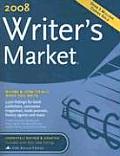 Perry: I wish I could say that I had a master plan, but I got out of college, was working as a nurse, and was content. I worked for a surgeon for a few months, and then I worked in a hospital setting in a rehabilitation unit for people who had closed head injuries and severe spinal cord injuries. And I did that for about seven months and went backpacking in Europe. While I was over there, I decided to try and do the writing thing, and that was it. So I went to the library and checked out Writer's Market and checked out the section about how to be a writer and, honestly, that's how I started. I just started sending things out.
Perry: I wish I could say that I had a master plan, but I got out of college, was working as a nurse, and was content. I worked for a surgeon for a few months, and then I worked in a hospital setting in a rehabilitation unit for people who had closed head injuries and severe spinal cord injuries. And I did that for about seven months and went backpacking in Europe. While I was over there, I decided to try and do the writing thing, and that was it. So I went to the library and checked out Writer's Market and checked out the section about how to be a writer and, honestly, that's how I started. I just started sending things out.
Then I ran into poets who started taking me to readings, and I got really into poetry at the same time. I was writing anything I could to pay the rent ? brochures, ad copy for used-car dealers. But by night I would be going to poetry readings and devouring poetry and then somewhere in the middle of all that I discovered what they were then calling "Creative Nonfiction." John McPhee, Susan Orlean, people like that. So then I really gravitated more toward the nonfiction world and, I don't know, it took me years and years but I slowly did less used car ads and more magazine pieces. Now I hardly ever do used car ads at all. [Laughs]
Megan: Do you know what you're going to write about next?
Perry: Yeah, I'm... [Beeping noises] Ooh, just a second... this might be a fire call that I have to take... [voice talking over intercom] Are you going to be around, Megan? I actually have to go on that ? it's an emergency call. I will call you back as soon as I get back.
Conversation resumes about half an hour later.
Megan: Was that just a false alarm?
Perry: No, it was real. It was a fairly serious call, but there were three of us that responded, and the other two people were closer. So once they're there and it sounds like they've got it under control, they can make the decision to call off anyone remaining.
Megan: That's probably the most exciting thing that's ever happened in the history of Powells.com interviews.
Perry: [Laughs] I'm glad I could supply it.
Megan: Let's see here... I was asking you about what you're working on now.
Perry: Oh, yeah, the general theme for the next book is "old timers." There's this old farmer that I want to hang out with down the road. He builds his own cannons.
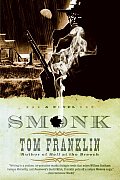 Megan: [Laughs] Wow.
Megan: [Laughs] Wow.
Perry: Yeah, that's all I really know at this point.
Megan: I was going to ask you if you were still a member of the volunteer rescue department, but there's no longer a need for that...
Perry: Yep, answered that one.
Megan: Read anything interesting lately?
Perry: Yes, I'm reading a wonderful Ron Powers biography of Mark Twain, which I'm enjoying immensely. And I'm reading Smonk, a novel by Tom Franklin, which came out awhile ago, but I'm enjoying it. Probably not the kind of thing I'd read to put my daughter to sleep at night. And then I've been rereading Donald Hall's Life Work, and then two poets that I've been reading lately: the collection A Book of Luminous Things by Czeslaw Milosz ? is that how you say that?
Megan: Asking the wrong person.
Perry: And then I've been reading Olena Kalytiak Davis.
Megan: Your youngest daughter is still pretty tiny, but does your oldest daughter comprehend that she's a part of the new book?
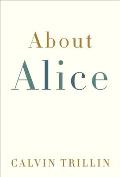 Perry: Yes, I've talked to her about it. I fear that one day, when she's 17, we'll probably have to talk about it again. I'm sure she'll think her dad is a ridiculous old bald guy. I was reading one of Calvin Trillin's books last year, and he writes a lot about his family. He said, "I promised my daughters that when they turned 12 until they were out of college, I wouldn't write about them. Because no one deserves to be written about in their teenage years." So that's been in the back of my head. Obviously I write about pretty personal stuff, but I also reserve huge chunks of my family's personal life, to remain private, in respect to them. I was doing this before my wife and daughter came along; I signed up for this ? they didn't.
Perry: Yes, I've talked to her about it. I fear that one day, when she's 17, we'll probably have to talk about it again. I'm sure she'll think her dad is a ridiculous old bald guy. I was reading one of Calvin Trillin's books last year, and he writes a lot about his family. He said, "I promised my daughters that when they turned 12 until they were out of college, I wouldn't write about them. Because no one deserves to be written about in their teenage years." So that's been in the back of my head. Obviously I write about pretty personal stuff, but I also reserve huge chunks of my family's personal life, to remain private, in respect to them. I was doing this before my wife and daughter came along; I signed up for this ? they didn't.
But yeah, she knows she's in there. I don't talk about it much ? you find that if people are conscious you're writing about them they tend to try to become characters.
Megan: Has she read any of it?
Perry: I don't think so. She knows some of the stories. She may or may not read it some day. I always tell my family and friends, "you don't have to read this stuff." I had a buddy that worked at the feed mill, and he was always apologizing to me: "Oh, I haven't read your book. I know I should read your book." And finally I said, "Listen man, you don't ask me to come down to the feed mill to watch you bag feed, so I don't expect you to read my books." I feel the same way about my family. My kids are more interested in having a dad than a writer.
Megan: Is there anything that people don't ask you that you wish they would?
Perry: It's not that the question never gets asked, but sometimes I don't know if I remember to mention it enough. But there's a whole other side to this writing thing that doesn't involve sitting at the keyboard with a cup of tea and your thoughts.
One thing that I try to convey, and especially in Coop, is that this little writing life that I am allowed just wouldn't be possible without my wife. Behind the scenes, she holds this family together. She's the one doing the bulk of the work homeschooling our daughter and making sure the animals are fed. I'm talking here about a woman who is more educated than I am. I'm just so lucky to have someone like her.
If you choose to support your family this way, it eats up a lot of your time and consciousness, and that means that my wife is often really holding things down. Thank goodness we're good friends, so it works out. But you'll forgive her if she doesn't think I'm constantly witty.
Michael Perry spoke from his home in Fall Creek, Wisconsin, on March 26, 2009.